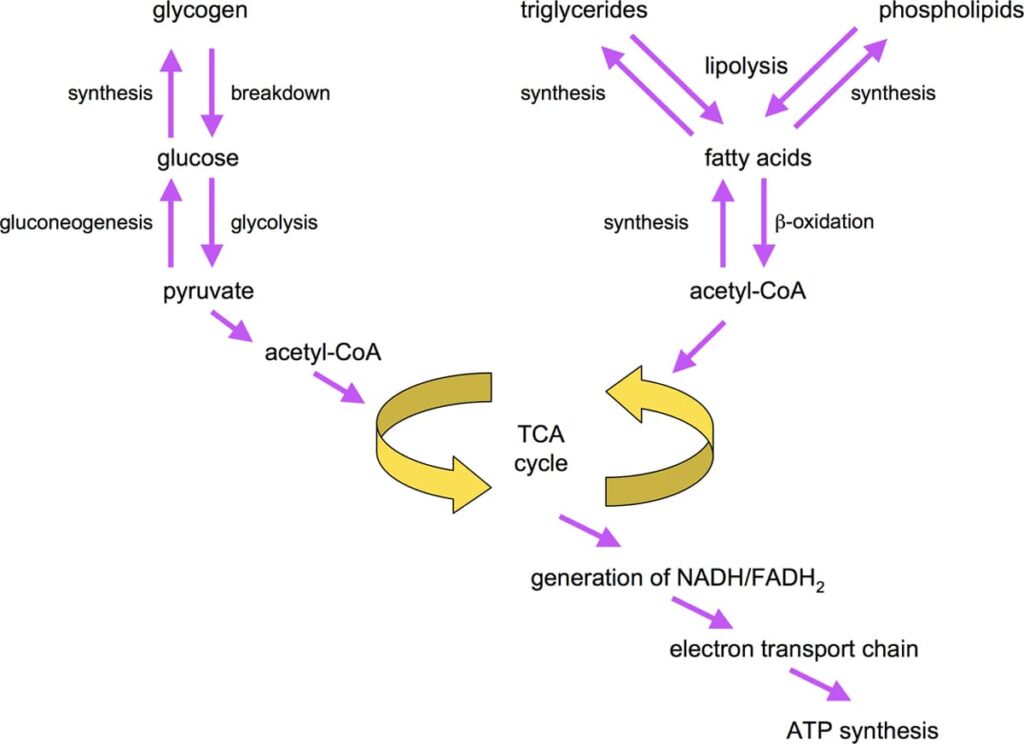Introduction
Metabolism refers to all the chemical processes that occur within an organism to maintain life. These processes are responsible for transforming the food we eat into energy, building and repairing tissues, and removing waste products from the body.
Metabolism is a complex process that involves many different biochemical pathways and reactions. It is divided into two main categories: catabolism and anabolism.
Catabolism refers to the breakdown of larger molecules into smaller ones. For example, when we eat carbohydrates, they are broken down into glucose molecules, which can then be used for energy production. This process releases energy that is used to power cellular processes.
Summary of Pathways

Symptoms
- Fatigue: Metabolism is responsible for converting food into energy, and a sluggish metabolism can result in fatigue and decreased energy levels.
- Weight gain or difficulty losing weight: If your metabolism is not functioning optimally, it can lead to weight gain or difficulty losing weight even with a healthy diet and regular exercise.
- Increased hunger or cravings: When your metabolism is slow, your body may not be able to efficiently break down food and convert it into energy, leading to increased hunger or cravings.
- Digestive issues: Metabolic dysfunction can cause digestive issues such as bloating, constipation, or diarrhea.
- High blood sugar levels: If your metabolism is not properly processing glucose, it can lead to high blood sugar levels, which can cause symptoms such as frequent urination, thirst, and fatigue.
- Hormonal imbalances: Metabolism is regulated by hormones, and dysfunction in metabolism can lead to hormonal imbalances, causing symptoms such as irregular periods, mood swings, and decreased libido.
- Insomnia: A sluggish metabolism can lead to decreased energy levels during the day and difficulty sleeping at night.
Imaging
- Positron Emission Tomography (PET): PET imaging uses a radioactive tracer that is injected into the body and taken up by tissues with high metabolic activity, such as cancer cells. The tracer emits positrons, which are detected by a PET scanner to produce a 3D image of metabolic activity in the body.
- Single Photon Emission Computed Tomography (SPECT): SPECT imaging is similar to PET imaging but uses a different type of radioactive tracer that emits single photons. SPECT is often used to image blood flow and metabolism in the brain.
- Magnetic Resonance Spectroscopy (MRS): MRS is a non-invasive imaging technique that uses magnetic resonance imaging (MRI) technology to measure the levels of certain metabolites in the body, such as creatine and choline. MRS is often used to diagnose and monitor neurological disorders.
- Computed Tomography (CT): CT imaging uses X-rays to produce detailed images of the body, including the metabolic activity of organs and tissues. CT scans can be used to diagnose and monitor cancer, heart disease, and other conditions.
Studies
- Metabolic pathways: These studies focus on understanding the various biochemical pathways involved in metabolism, including how energy is produced, how nutrients are processed, and how waste products are eliminated from the body.
- Nutrient metabolism: These studies explore how different nutrients, such as carbohydrates, fats, and proteins, are metabolized in the body and how they affect overall health and disease risk.
- Exercise metabolism: These studies investigate how metabolism is affected by exercise, including how different types of exercise impact energy production, nutrient utilization, and overall metabolic health.
- Metabolism and disease: These studies investigate how metabolism is affected by various diseases, such as diabetes, obesity, and cancer, and how metabolic dysfunction can contribute to disease development and progression.
- Metabolism and genetics: These studies explore how genetic variations can affect metabolism, including how they impact energy production, nutrient utilization, and disease risk.
- Metabolism and the microbiome: These studies investigate how the gut microbiome, which is the community of microorganisms that inhabit the digestive tract, can affect metabolism and overall health.
Treatment
- Dietary modifications: Depending on the specific type of metabolism disorder, dietary modifications may be necessary to improve metabolic function. This may involve limiting certain foods, increasing intake of others, or taking supplements.
- Medications: Certain medications can help to manage metabolic disorders. For example, insulin injections are commonly used to treat diabetes, and medications that reduce cholesterol levels can help to manage hyperlipidemia.
- Hormone therapy: In some cases, hormone therapy may be necessary to regulate hormonal imbalances that are contributing to metabolic dysfunction.
- Enzyme replacement therapy: Some metabolism disorders are caused by a deficiency or absence of certain enzymes, and enzyme replacement therapy may be necessary to restore normal metabolic function.
- Surgery: In some cases, surgery may be necessary to treat metabolic disorders. For example, bariatric surgery may be recommended for individuals with severe obesity to promote weight loss and improve metabolic function.
- Lifestyle modifications: Making lifestyle changes such as increasing physical activity, reducing stress, and getting adequate sleep can help to improve metabolic function and manage some metabolism disorders.
Complications
- Diabetes complications: Diabetes is a metabolic disorder that can lead to a number of complications, including nerve damage, kidney disease, vision problems, and cardiovascular disease.
- Metabolic acidosis: This is a condition that occurs when the body produces too much acid, leading to a disruption of the body’s acid-base balance. It can be caused by a variety of metabolism disorders, and can lead to serious health complications.
- Hyperlipidemia complications: Hyperlipidemia, which is characterized by high levels of cholesterol and triglycerides in the blood, can lead to atherosclerosis, which is the buildup of fatty deposits in the arteries. This can increase the risk of heart attack and stroke.
Check out USMLE Step 1 Mastery: Comprehensive Course and Lecture Notes.



